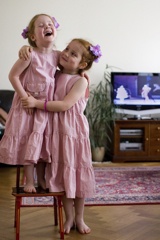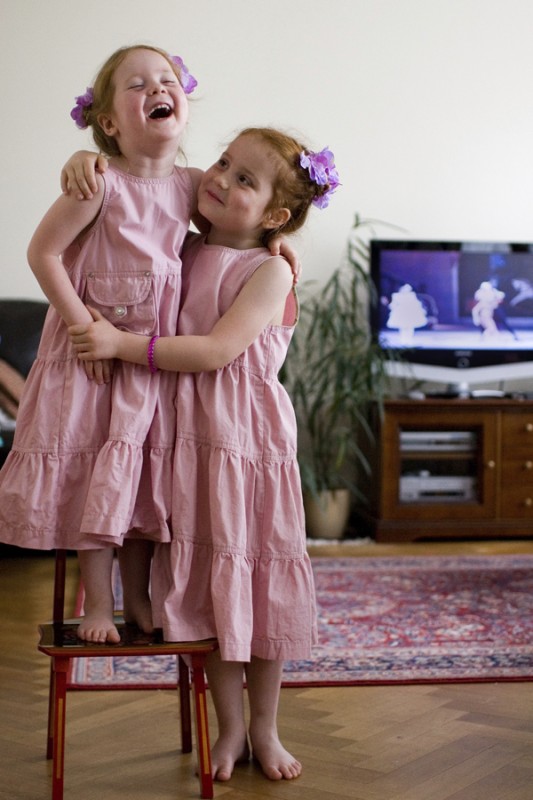Empowering the Younger Sibling
An interview with Dr. Laura Markham
“I can’t” is a troubling phrase my younger son is repeating too often. Maybe it’s just a phase or perhaps it’s because the brother he adores can do everything: climb trees, sing in round and read. Unlike my big guy who only had parents looking after him for his first three years, my little guy has two grown-ups and this hybrid dude – a perfect blend of peer and parent. So, when my younger tries to draw a car like my elder, it’s so frustrating because the lines he draws don’t look like his brother’s. How can a parent help their younger child feel good about who they are right now and lessen the natural inclination to compare? How can we help younger siblings have reasonable expectations of themselves? Dr. Laura Markham, shares some tips to turn the “I can’ts” into “I cans”! — Laurel Moglen, TMC Managing Web Editor
How can parents help a younger sibling feel empowered?
First, I want to point out that the younger sibling perceives their older sibling as a hero, and it’s no wonder. Their big sister or brother can do so many things – and do them well. The younger sibling can tend to feel as if s/he can never do such wondrous things as the elder – like reading or tying shoelaces or buttering bread! This is a natural response. In fact, nature has designed humans to learn from their elders. Furthermore, culture is transmitted through older children. They are capable of communicating it to their younger sibling in a way they can understand. The younger sibling often looks up to their older sibling to figure out how the world works.
Parents can support their younger child’s sense of self in several ways:
Put things in perspective. Parents can say to their younger child, “You’re three, and when you’re older you’ll be able to ride a bike without training wheels as well (or draw a house, or throw a ball far, etc). Three year olds can’t do all the things six year olds can do, and that’s okay! Your body isn’t ready for riding a bike yet, but look – you ride a tricycle, and one day you’ll be able to ride a bike too!”
Give a timeline. Parents can point out to their child that it took their sibling a long time to learn how to ride a bike. “She practiced a lot, and built up her muscles. With practice, and in time, you too will ride a bike. Your sister started off knowing nothing, and then she learned. That’s exactly what will happen with you. Just give yourself some time, and keep working at it!”
Make books. Parents can write stories for their children about whatever issue might come up, for instance, “How Lucy Learned To Ride a Bike.” The purpose is to give your child a context and help him to see the positive ending that is in store, while normalizing the bumps along the way. Humans thrive on stories; they need stories to make sense of their world. The narrative can be extremely simple. Parents need not put pressure on themselves to write something publishable! Their child will be delighted to have something written just for them. Be sure to cast the elder sibling in a positive light.
Encourage your child’s uniqueness. Whatever your younger child is drawn to, support that exploration. Keep in mind research shows when an elder sibling really excels at something — let’s say soccer — the younger sibling will look for a place where they can flourish that is not dominated by their sibling. If you really want your younger child to play soccer, perhaps let the child know that a peer is playing it. Don’t make it about the elder, or even mom or dad playing it. This is a “back door” entry into an activity.
What’s the most common parenting pitfall when it comes to parenting a younger sibling?
The most common is taking the younger sibling’s side against the elder. This is so natural! Parents are designed to protect their young, and of course our younger child deserves our protection. But parents need to be very careful about continually blaming the elder for whatever conflict occurs — even when it clearly is, or seems to be, the elder’s “fault”. With repetition, parents will create “victim” and “perpetrator” roles for their children. The kids will take-on these roles with vigor, and so the parts they play become part of their personality. This also undermines the potential for positive connection in the sibling relationship, and creates more fights, making parenting more difficult.
So parents need to do the hard work of reprogramming themselves. Try to wipe out “blame” and seek “solutions.” Parents can say, “Hey, I’m hearing a lot of screaming, and I see you both are crying. Wow, you two must be having a hard time right now. Let’s see if we can work this out.” If one child has been hurt, parents should tend to the “hurt” child first — but without blame. “I see Joshua is holding his forehead. Josh are you okay? Oh, you say your brother hit you. Okay, well, should we get you some ice? Would you like me to hold you?” If the “perpetrator” is looking stricken, the parent can engage them in “repair” by asking warmly “Could you please go get a wet washcloth for Josh, sweetie?” (If they’re too mad to participate, don’t push this.)
When everyone is calmed down, parents should work with one child at at time. Parents should listen, repeat back the stories told to them, empathize with both children — chances are both kids have legitimate reasons to be upset. Once the kids feel better, parents can help each child see things from the other’s point of view — “I understand why you were upset! Your brother wrecked your tower… I wonder if maybe he just wanted to play with you?” Then, parents can help each child brainstorm ways to make amends — maybe make a card for the other, or help them build a new tower. Finally, the parent can help each child express their feelings to the other: “I wanted to play with you…I’m sorry I wrecked your tower”, or “I’m mad you wrecked my tower, but you’re still my friend.” This may seem labor intensive, but if parents do this intensively for three months, kids learn the skills, and begin to handle the process themselves, leading to a better relationship and a more peaceful home.
The bottom line is – both siblings are young and learning. Parents should empathize and by doing so, children will learn to empathize.
How can parents mitigate competition between siblings?
For kids, it can be very hard to share their parents. Competition between siblings comes from feeling that there isn’t enough parental “presence” to go around. It isn’t just about love, or about attention (which often takes the form of trying to make kids “better”), it’s about really pouring love into a child. Parents need to fill their childrens’ cup full of love daily.
One trick is ensuring each child gets uninterrupted alone time with each parent. Start by setting your older child up with a really engrossing activity. Explain to him that it’s time for you to spend some alone time with his sister, and when that’s done, you’ll spend alone time with him. Set a timer for 15 minutes, during which you roughhouse with your younger child and get her laughing (releasing oxytocin, the bonding hormone). When the timer goes off, take an extra moment to hold your child. Tell her how much you love her, how you’re so lucky you get to be her mother, and ask if you can spend time like this together the next day. Some children will cry because they have reconnected with you and now feel they’re losing you again; hold her and empathize while she “shows” you her feelings.
An hour later, set your little one up with something really engrossing — books on CD work best for young kids — while you spend “special time” with your older child. Avoid structured activities in favor of games that get your child giggling, or follow his lead if he wants you to watch him do something and simply “admire” him: “I see you working so hard on that soccer kick…you aren’t giving up…now you’re using your left foot!”
If you do this daily for a week, I promise the competition you’re seeing between your kids (like climbing over each other to see who gets there first) will diminish and you’ll see them being sweet to each other more often.

